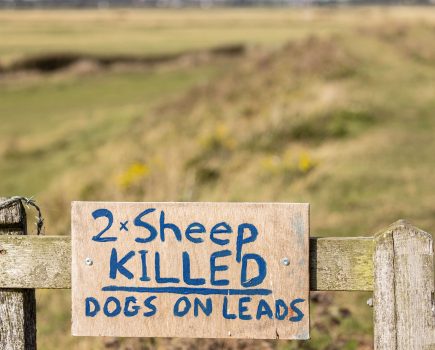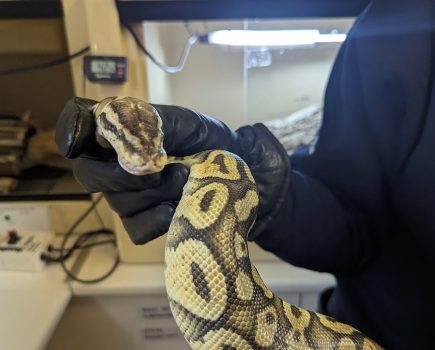Livestock keepers are pinning their hopes on Defra’s Bluetongue vaccination strategy. But will it work? Some leading veterinary groups have their doubts. SIMON MCEWAN reports.
Livestock keepers are pinning their hopes on Defra’s Bluetongue vaccination strategy. But will it work? Some leading veterinary groups have their doubts. SIMON MCEWAN reports.Bluetongue has the potential to be far more damaging to livestock keepers than either foot-and-mouth or avian flu. A vaccination strategy is now in place to halt the disease – but some leading vets doubt that it will be effective.The strongest criticism of the strategy has come from European vets, and their attack led to a furious response from Fred Landeg, our Acting Chief Veterinary Officer.The Federation of Veterinarians of Europe (FVE) said bluntly that Britain’s policy will not halt the disease – and castigated Defra for its approach to animal disease issues generally, saying the its bluetongue strategy will by compromised by cost cutting.They said that, with a voluntary vaccination scheme, it will be almost impossible to monitor the programme and could lead to problems when exporting vaccinated stock without proof that the vaccine had been administered effectively.“The British plans fail to guarantee an optimal protection of the animals against the disease, while opportunities to limit further spread of the disease remain untapped,” said Walter Winding, FVE president.He said the strategy was “probably driven by a strong desire to cut costs, and has little to do with animal health and welfare”.“Irrespective of the disease outbreaks the UK has faced over recent years, it continues to cut budgets and to reduce its Animal Health Services, something that goes completely against the new EU Community Animal Health Strategy, which focuses on prevention rather than cure,” he said.
‘Deeply offensive’Defra later released the contents of a letter from Dr Landeg to Dr Winding at FVE. In this he said: “I was surprised and very concerned to see the Federation’s ill-informed press release about the UK’s emergency Bluetongue vaccination plan.“To suggest that the UK approach “was probably driven by a strong desire to cut costs, and has little to do with animal health and welfare” is both inaccurate and deeply offensive … “We want to ensure a rapid coverage of vaccination targeted at areas of greatest risk,” he wrote.“Accordingly, the UK plan, which has been developed in close partnership with a core group of stakeholders, including a senior member of the UK veterinary profession and representatives from the farming and meat industry outlines a vaccination programme which will ensure a rapid coverage through a voluntary approach unfettered by bureaucracy.“We are in a strong position to act swiftly and reduce the risk of disease spread,” wrote Mr Landeg. “The European Commission agrees the plan is capable of meeting its objectives and, like other European countries, we will be using a provisionally approved vaccine because that is all that is available for this serotype.”
RIGHT APPROACHIn the wake of this row, it was announced that 12 key farming groups in Britain had joined forces to combat Bluetongue.The organisations, representing livestock farmers, livestock markets, meat processing, dairy processing, and the veterinary profession, called themselves the Joint Campaign Against Bluetongue (JAB).The group said: “We recognise that a voluntary approach to vaccination has raised some eyebrows in some quarters, but we are convinced that a voluntary, industry compulsory, mass vaccination programme is the right approach.“We believe that the EU’s bureaucratic rules for a compulsory vaccination programme … would have slowed down the process of vaccination, put individual farmers’ businesses at greater risk, and increased the likelihood that the virus would spread across the country before animals could be vaccinated.”JAB has now embarked on a major campaign to urge all farmers with susceptible livestock to use the vaccine as soon as it is available.The campaign, supported by Defra and Animal Health, will use the media as well as more direct contact through farmers meetings, livestock markets and contact with private veterinary surgeons.
‘WE HAVE TO HOPE’But when CS contacted one of the organisations in the group, the British Veterinary Association, there did not seem much enthusiasm for the Defra strategy.President elect Nicky Paull said: “If I had a choice I would want to vaccinate 100% of susceptible livestock for Bluetongue today. But we do not yet have a vaccine and the only way we could be sure that all livestock were protected once the vaccine is available is to make it compulsory. “Defra is not choosing this route so we have to make the best of the options offered in the UK; we have to hope that the vaccine is available as quickly as possible in sufficient doses to keep ahead of the infection risk and that livestock keepers opt to vaccinate. “80% cover is the figure quoted as needed, but the UK should be aiming for 100%. If we do not get 80% then the strategy will probably fail – and that means, for those who choose not to vaccinate, not only will they increase massively the risk to their neighbours’ stock but they are likely to lose their own stock to Bluetongue.“We need to really get the message out to all livestock holders that we have this very small opportunity to halt this disease in its tracks. The big fear is that if this window closes we may have to accept living with this disease long term.”The DiseaseBluetongue affects all ruminants, including sheep, cattle, deer, goats, alpacas and llamas. It does not affect horses. Although sheep are most severely affected, cattle are the main reservoir of the virus and are important in the epidemiology of the disease. It does not affect humans.
CAUSEThe disease is caused by a virus spread by certain types of biting midges. It is commonly seen in the late summer and autumn and its presence is confirmed by laboratory tests.
SymptomsThese include changes to the mucous linings of the mouth and nose and the coronary band of the foot.
EFFECTSCS columnist Alan Beat writes: “Bluetongue has the potential to be far more damaging to smallholding than either FMD or Avian flu. It is often fatal, killing up to 50% of sheep infected, sometimes 70%, and during the current epidemic in Europe has killed some cattle as well. It is also more likely to become endemic, posing long-term animal welfare issues. Slaughter and movement bans have both proved ineffective in controlling the disease, so vaccination is seen as the only realistic solution.”Two key questions to answerMary Critchley is founder of the website www.warmwell.com, which carries extensive information about animal diseases. This is her view about vaccination.There are two questions here. Will the vaccine work and will the UK’s chosen method of administering it work? Ironically, there are more problems with Bluetongue vaccine that we are so keen to use than for Foot and Mouth vaccines which (idiotically) we are not permitted to use – since the vaccine for Bluetongue serotype 8 that is being developed is untried. The live vaccine used in Africa for other bluetongue serotypes is unsuitable for the UK. We need a dead vaccine and have our fingers crossed that such a vaccine will be effective. Intervet advises that cattle have two ‘sheep’ doses each several weeks apart to give immunity. They may suggest the use of larger doses for cattle when their vaccine is released since large animals will require a greater quantity of antigen in the inactivated vaccine dose than small animals. It may be true that Intervet vaccine used on calves only protects half of them, although if, having been vaccinated, those animals then get immediately infected before the vaccine has a chance to kick in, they will at least have a shorter and lower viraemia than they would have had without any vaccination. Intervet cannot give any information yet about the efficacy of its vaccine with goats. Nor can Fort Dodge. This is hardly reassuring to those who want to protect their goats.As for the campaign in England, Defra ordered far too little vaccine and, what’s more, placed their entire order with one company only. Placing it with two or more would have led to healthy competition and assurance that we would get some at the earliest possible date even if there were a breakdown in production. If we are to prevent the spread of BTV-8 virus via infected female midges, effective vaccination of England’s cattle is essential. Restricting vaccination to areas already designated Protection Zones seems crazy when what is required is pre-emptive protection for everyone. Making farmers pay the full cost and relying on vets to be able to encourage a sufficient number of farmers to vaccinate may be thought very short-sighted when the very survival of livestock farming in the UK may be at stake. Nor can one disagree with Walter Winding’s worries, Fred Landeg notwithstanding. It was almost unbelievably foolish that Defra stopped all Bluetongue vaccine development at Meriel after the FMD leak in the summer of 2007 when it was progressing so well (this despite outbreak investigator Professor Spratt saying there was no scientific reason to remove their licence for work on Bluetongue). It was obvious to so many that infection in the UK was inevitable. THE STRATEGYAs of March 19, there were 110 premises in Britain where Bluetongue had been confirmed. Protection and Surveillance Zones, with movement restrictions, had gradually expanded and covered a large swathe of the country.Defra has ordered more than 22 million doses of Bluetongue vaccine and it will be available in May.Vaccination will begin in the Protection Zone, where the disease is most likely to re-emerge. EU rules do not allow vaccination elsewhere, so the PZ will gradually be extended and areas most at risk targeted first.Vaccination is voluntary as Defra believes this will be less bureaucratic, quicker and cheaper. At least 80% of susceptible animals must be vaccinated for the strategy to be effective.The vaccine will be sold as a prescription-only medicine by private vets. Livestock keepers are advised to contact their vet and make sure they are in the queue for the vaccine. The cost is expected to be about £1 a dose. The livestock keeper is responsible for administering the vaccine.
DevastatingThe vaccination programme must last at least three years. Farmers must wait 60 days after vaccination before they can move animals out of the PZ. They can be moved after 14 days following a test showing immunity.The second year of the European outbreak was far more devastating than the first, with thousands of animals dying and many more suffering reduced productivity and infertility. Livestock keepers are encouraged to weigh up the relatively low cost of vaccination against the potentially devastating personal economic losses of an outbreak on their holding. There is no compensation for bluetongue.MORE: www.defra.gov.uk/animalh/diseases/ notifiable/bluetongue/control/ index.htm#1







